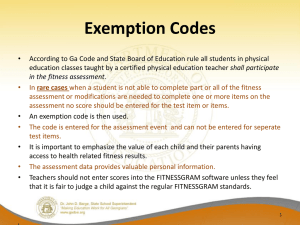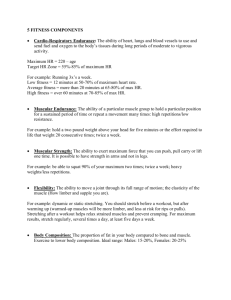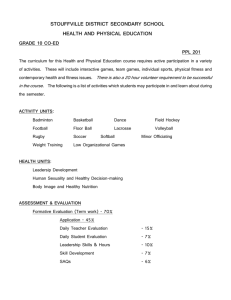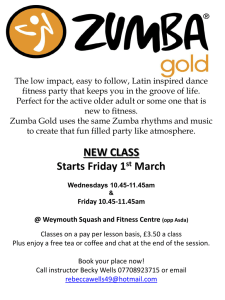Fitness Concepts
advertisement
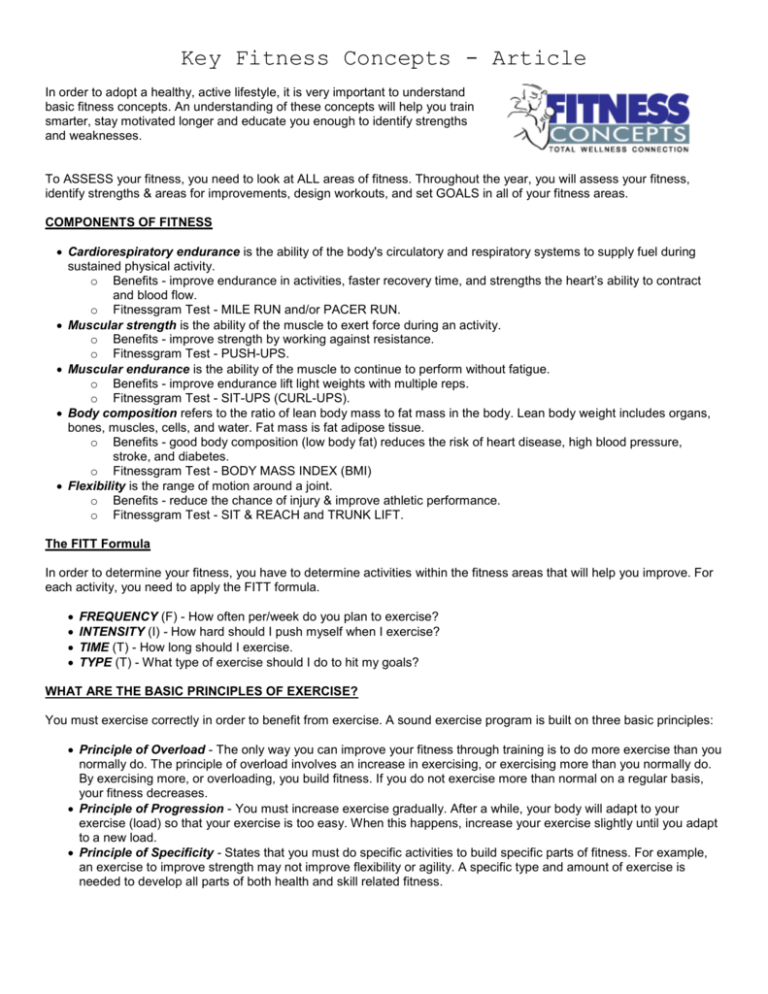
Key Fitness Concepts - Article In order to adopt a healthy, active lifestyle, it is very important to understand basic fitness concepts. An understanding of these concepts will help you train smarter, stay motivated longer and educate you enough to identify strengths and weaknesses. To ASSESS your fitness, you need to look at ALL areas of fitness. Throughout the year, you will assess your fitness, identify strengths & areas for improvements, design workouts, and set GOALS in all of your fitness areas. COMPONENTS OF FITNESS Cardiorespiratory endurance is the ability of the body's circulatory and respiratory systems to supply fuel during sustained physical activity. o Benefits - improve endurance in activities, faster recovery time, and strengths the heart’s ability to contract and blood flow. o Fitnessgram Test - MILE RUN and/or PACER RUN. Muscular strength is the ability of the muscle to exert force during an activity. o Benefits - improve strength by working against resistance. o Fitnessgram Test - PUSH-UPS. Muscular endurance is the ability of the muscle to continue to perform without fatigue. o Benefits - improve endurance lift light weights with multiple reps. o Fitnessgram Test - SIT-UPS (CURL-UPS). Body composition refers to the ratio of lean body mass to fat mass in the body. Lean body weight includes organs, bones, muscles, cells, and water. Fat mass is fat adipose tissue. o Benefits - good body composition (low body fat) reduces the risk of heart disease, high blood pressure, stroke, and diabetes. o Fitnessgram Test - BODY MASS INDEX (BMI) Flexibility is the range of motion around a joint. o Benefits - reduce the chance of injury & improve athletic performance. o Fitnessgram Test - SIT & REACH and TRUNK LIFT. The FITT Formula In order to determine your fitness, you have to determine activities within the fitness areas that will help you improve. For each activity, you need to apply the FITT formula. FREQUENCY (F) - How often per/week do you plan to exercise? INTENSITY (I) - How hard should I push myself when I exercise? TIME (T) - How long should I exercise. TYPE (T) - What type of exercise should I do to hit my goals? WHAT ARE THE BASIC PRINCIPLES OF EXERCISE? You must exercise correctly in order to benefit from exercise. A sound exercise program is built on three basic principles: Principle of Overload - The only way you can improve your fitness through training is to do more exercise than you normally do. The principle of overload involves an increase in exercising, or exercising more than you normally do. By exercising more, or overloading, you build fitness. If you do not exercise more than normal on a regular basis, your fitness decreases. Principle of Progression - You must increase exercise gradually. After a while, your body will adapt to your exercise (load) so that your exercise is too easy. When this happens, increase your exercise slightly until you adapt to a new load. Principle of Specificity - States that you must do specific activities to build specific parts of fitness. For example, an exercise to improve strength may not improve flexibility or agility. A specific type and amount of exercise is needed to develop all parts of both health and skill related fitness. Name_______________________________ Grade ______ Period_____ Roll Call #_____ Key Fitness Concepts - Worksheet Directions: Use the article “Key Fitness Concepts - An Overview” to answer the questions below. The answers must be in your own words and summarized to show understanding. If you cannot answer a question from lack of information, use the internet or a dictionary to help. Answers must be in complete sentences. 1. How do you properly assess (evaluate) your fitness level? 2. What are the 5 fitness concepts? 3. Which principle do you feel is the most important to improve your overall fitness? Why? 4. Why is the FITT formula so important to know? 5. Why do you think it is more important for middle school students to build muscular endurance instead of muscular strength? 6. What is specificity? (Give an example) 7. What is progression? (Give an example) 8. What is overload? (Give an example) 9. What makes you your lean mass? 10. What ratio is body composition measuring?
